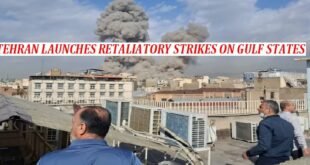01-07-2024
BAGHDAD: Five large bombs were discovered hidden in the walls of the historic al-Nuri Mosque in the city of Mosul in northern Iraq, a remnant of the armed group ISIL’s (ISIS’s) rule over the region.
The mosque famous for its 12th-century leaning minaret was destroyed by ISIL in 2017 and has been a focal point of the UN cultural agency UNESCO’s restoration efforts since 2020.
 The UN agency said five large-scale explosive devices, designed for significant destruction, were found inside the southern wall of the Prayer Hall on Tuesday.
The UN agency said five large-scale explosive devices, designed for significant destruction, were found inside the southern wall of the Prayer Hall on Tuesday.
“These explosive devices were concealed within a specially rebuilt section of the wall,” a UNESCO statement said on Saturday.
“Iraqi authorities were promptly notified, secured the area, and the situation is now fully under control. One bomb has been defused and removed while the remaining four are interconnected and will be safely disposed of in the coming days.”
Iraqi authorities requested UNESCO halt all reconstruction operations at al-Nuri Mosque and evacuate the entire complex until the devices are disarmed.
ISIL leader Abu Bakr al-Baghdadi declared “a caliphate” from the mosque a decade ago on June 29, 2014, leading to its destruction when fighters blew it up during the battle to liberate Mosul in 2017.
The discovery of the bombs underscores ongoing challenges in clearing Mosul of explosives and revitalizing its devastated urban areas.
International efforts, supported by the United Nations, focus on mine clearance and aiding in the city’s recovery. Despite progress, much of Mosul’s old city remains in ruins, marked by minefield warning signs, highlighting the complexity of post-conflict reconstruction.
UNESCO aims to complete the full reconstruction of al-Nuri Mosque by December, “finally erasing the stigma of the Daesh occupation,” the statement said, using the Arabic acronym for ISIL’s name.
A decade after the armed group declared its caliphate in large parts of Iraq and Syria, ISIL no longer controls any land, lost many prominent leaders, and is mostly out of the news headlines.
 Still, the group continues to recruit members and claim responsibility for deadly attacks around the world, including lethal operations in Iran and Russia earlier this year that left many dead.
Still, the group continues to recruit members and claim responsibility for deadly attacks around the world, including lethal operations in Iran and Russia earlier this year that left many dead.
Four years since the battle ended in Mosul, Iraq, much of the city is still in ruins. The depth of the destruction has made it impossible for thousands of families to return. For those who remained, daily life is a struggle and potentially dangerous as mines and unexploded devices litter parts of the city.
“There are some dangerous places here that we are not allowed to play in because of mines,” said Yaqeen, 11 years old, who lives in Mosul’s old city. “Before the conflict, we had a shop here and I had friends. We used to go out and play. The houses here were so beautiful, unlike the way they are now: in ruins and damaged.”
Residents also face chronic water and electricity shortages. A recent study by the ICRC found that today less than 15 percent of people on Mosul’s left bank, the eastern half of the city had enough water to meet their daily needs. On the right bank, this number rose to only 35 percent. This is partly because the war destroyed vital infrastructure like water pumping stations.
“Water pumps were destroyed during the conflict which means that the water doesn’t reach upper areas in the old city and people, me included, are forced to rely on water tanking services and jerrycans,” said Ahmad, a single father who returned to Mosul’s Old City three years ago. He is in a wheelchair after suffering an injury in the conflict. (Int’l Monitoring Desk)
 Pressmediaofindia
Pressmediaofindia




